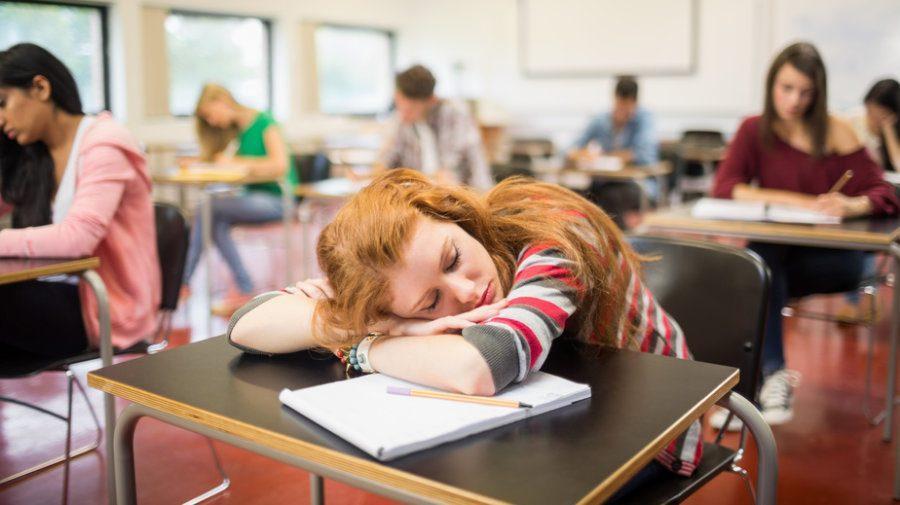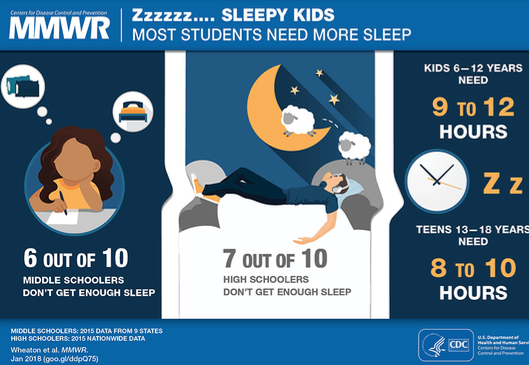Students who get more sleep at night are healthier and do better academically, according to a new study by the University of Washington and the Salk Institute for Biological Studies.
Parents and health organizations in communities around the country have raised a red flag that early school start times go against a student’s natural sleep cycle, leading to sleep deprivation.
Scientists generally recommend that teenagers get eight to 10 hours of sleep each night. But early-morning obligations—such as school start times—force teens to either shift their entire sleep schedule earlier on school nights, or truncate it.

A 2017 survey by the U.S. Centers for Disease Control and Prevention shows only one-quarter of high school-age adolescents reported sleeping the minimum recommended eight hours each night.
“When principals and school leaders are tasked to improve academic performance, it is clear that we might need to look closer at advocating for later school start times,” said AFSA President Ernest Logan. “We know from experience there are dozens of external factors that impact learning, but sleep may be having a greater role than has been thought.”
“All of the studies of adolescent sleep patterns in the United States are showing that the time at which teens generally fall asleep is biologically determined—but the time at which they wake up is socially determined,” said Gideon Dunster, a University of Washington biology doctoral student who is the lead author of the most recent study.
“This (early wake-up time) has severe consequences for health and well-being,” Dunster noted, “because disrupted rhythms can adversely affect digestion, heart rate, body temperature, immune system function, attention span and mental health.”

This is not news to many communities. “We’ve known for a long time that the (early school) start times are really bad for kids,” Fairfax County, Virginia, school board member Sandy Evans told The Washington Postin October 2014.
Evans led a charge in 2014 that pushed the public schools in Fairfax County, the nation’s 12th largest school district, to move the start of the high school day to 8 a.m. from 7:25 a.m.
After a two-decade battle to change the policy, Evans said, “now we can start our teenagers down a much healthier path.”
Horacio de la Iglesia, a University of Washington biology professor and one of the authors of the new report, has offered an apt comparison to help policymakers understand the larger issues: “To ask a teen to be up and alert at 7:30 a.m. is like asking an adult to be active and alert at 5:30 a.m.”
The new study revealed beyond additional shut-eye that the wake-up times for students on weekdays and weekends moved closer together. And their academic performance, at least in the biology course examined, improved: Final grades were 4.5 percent higher for students who took the class after school start times were pushed back, compared with students who took the class when school started earlier.
This new research reinforces previous data. In 2016, a paper written by Dr. Anne Wheaton of the National Institutes of Health (NIH) outlined evidence that delaying school start time increases weeknight sleep.
Studies Wheaton reviewed saw a significant increase in sleep duration even with relatively small delays in start times of a half-hour or so. Later start times also generally correspond to improved attendance, less tardiness, less falling asleep in class, better grades and fewer motor vehicle crashes, she noted.
The American Academy of Pediatrics recommended in 2014 that middle and high schools begin instruction no earlier than 8:30 a.m.,though most U.S. high schools start the day before then. In 2018, California lawmakers nearly enacted a measure that would ban most high schools from starting class before 8:30 a.m.
In New York City, the nation’s largest school district, CSA, Local 1said the teachers union contract states no day can begin before 8 a.m. unless changed by a school base option. Principals, in consultation with teachers and parents, can shift the start time earlier or later to better accommodate the needs of students and the community, but such a shift requires a 55 percent positive vote by the staff.Currently, the New York City chancellor is reviewing early start times and may offer policy guidance in the future.
Last month, students in Howard County, Maryland, urged the school board to consider changes to its start times. The Howard County Administrators Association (HCAA), AFSA Local 36 has not taken a formal stand on the issue of a later school start time, but the group noted in recent years the county board of education reviewed similar requests and chose not to pursue changing start times, citing the broad impact of this type of change on the entire district.
HCAA Executive Director Ron Caplan said starting class later in the day is a good idea if the district can work out the finances. “It is a budget issue,” he said, “as high school buses pick up elementary students” as they make multiple runs. However, if monies from other academic programs that touch students are used to change the start times, it becomes more complicated.
At the county’s most recent school board meeting, The Baltimore Sun reported,siblings Zaki and Amina Pucci advocated for later start times. An eighth grader at Elkridge Landing Middle School, Amina said the school system’s hard work to create “interesting curriculum…will be taken for granted and neglected by sleep deprived students,” according to The Sun.
Zaki, a fourth grader at Rockburn Elementary School, said he felt well rested when going to school because he goes to sleep at 9 p.m. and wakes up at 8 a.m., but sees his fellow classmates struggling, sometimes putting their hands and heads on their desks to rest, The Sun’s story said. “I worry that I will be forced to compromise my education in the future,” Zaki said.
Alexander Horn, a freshman at Wilde Lake High School, called on the school board to adopt later school start times at the high school level. “Making later start times is the best thing the school system can do for mental health,” he said.
De la Iglesia, the University of Washington biology professor, asks the most significant question on the issue. “School start time has serious implications for how students learn and perform in their education,” he said. “Adolescents are on one schedule. The question is: What schedule will their schools be on?”